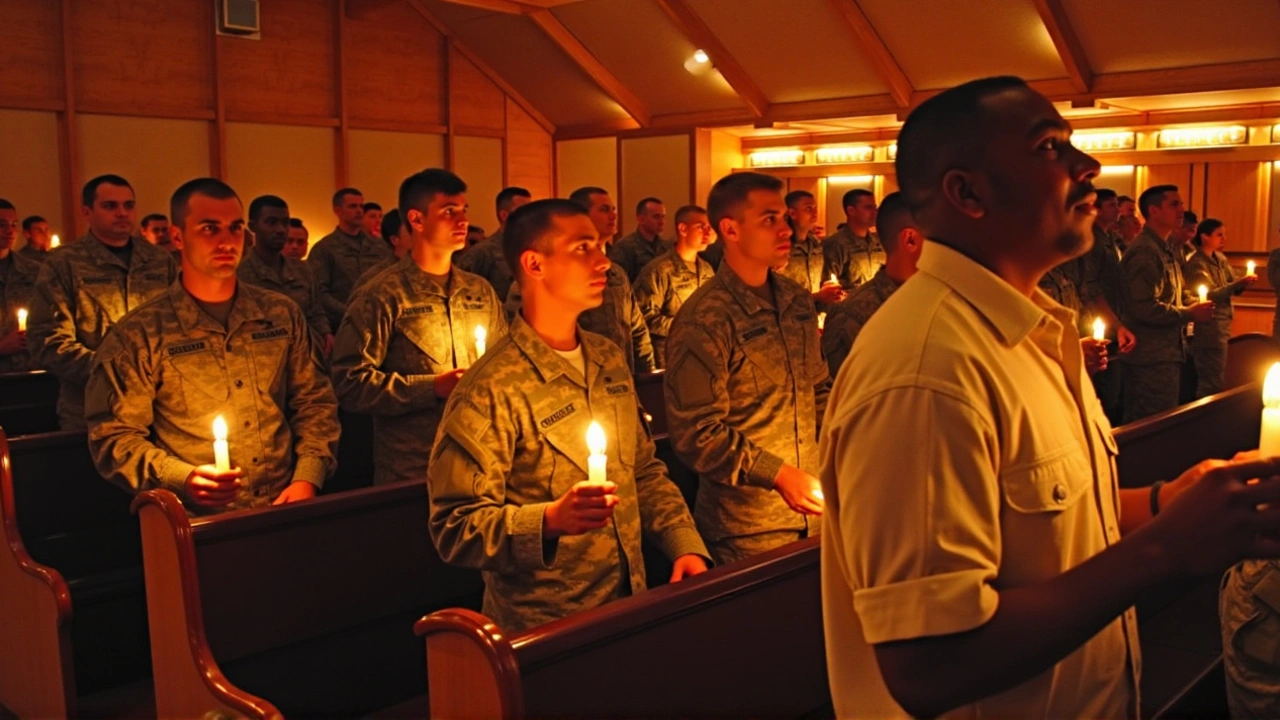The holiday season in the United States is as much a time of celebration as it is of reflection. Within the ranks of the US military, greetings like ‘Merry Christmas’ and ‘Happy Holidays’ are more than mere pleasantries. They are reflections of a broader cultural and constitutional commitment to religious freedom and the inclusion of diverse beliefs, which are pivotal to the military’s ethos. At the crux of this discussion is the First Amendment, which has long served as a cornerstone of American liberty, guarding both the free exercise of religion and shielding citizens from government-imposed religion.
The First Amendment's provisions mean that service members have the right to express their beliefs without fear of coercion or being sidelined. This dual purpose of protecting and enabling religious expression is deeply ingrained within the Department of Defense's policies. These policies strive to ensure that no one in uniform feels compelled to choose between their religious convictions and their commitment to military duty. By fostering this environment of respect and understanding, the military acknowledges the myriad ways in which faith can manifest without privileging one belief system over another.
Religious accommodation in the military isn't just an ideological stance; it serves a practical purpose. In a force as diverse as the US military, incorporating various beliefs is not merely a matter of principle but of operational necessity. A cohesive and inclusive force allows for better morale, enhanced cooperation, and heightened efficiency. When service members see their beliefs being respected, they are more likely to thrive in their roles, contributing meaningfully to the overall mission.
This approach bears testament to the values that the United States holds dear—liberty, equality, and respect. As service members are sworn to defend these ideals, they represent what distinguishes the nation as a beacon of freedom. This commitment is evident not just in combat or policy-making but in simple, everyday interactions. Holiday greetings during this season exemplify this notion. By saying 'Merry Christmas,' individuals acknowledge a specific faith tradition, while 'Happy Holidays' serves as an inclusive nod to varied beliefs and cultural practices.
The choice of greeting can sometimes spark debate. In an increasingly pluralistic society, there is a balancing act between honoring specific traditions and embracing a broader, more inclusive set of values. The US military, in fostering a space where both greetings are acceptable, reminds us of the importance of civil discourse and mutual respect. This balance ensures that the pluralism in America strengthens rather than divides, serving as an example of how diverse perspectives can coexist harmoniously.
As the holiday season unfolds, it is worth considering the deeper significance behind these greetings. They are not just festive words or rote exchanges but symbols of the United States' steadfast commitment to honoring individual dignity and belief. Whether one wishes a 'Merry Christmas' or 'Happy Holidays,' the underlying message is one of unity, respect, and shared humanity.
The resilience of the US military and, by extension, the nation, lies in this celebration of diversity and freedom of expression. Rather than being a source of conflict, the variety of beliefs within the armed forces ensures a richer and more robust community. This is reflective of the nation’s values, where freedom of religion transcends legal frameworks to become a shared commitment to understanding and honoring every individual's dignity.
In conclusion, the interplay between the First Amendment rights and military values underscores the importance of maintaining a space where all beliefs are respected. It is this homage to freedom and diversity that strengthens the United States, not just as a military power, but as a society committed to the principles it holds dear. The greetings exchanged during the holiday season, whether they are 'Merry Christmas' or 'Happy Holidays,' serve as enduring reminders of the liberty and respect that outline the American narrative.






Aryan Singh
December 24, 2024 AT 17:20When service members greet each other with "Merry Christmas" or "Happy Holidays" they're actually putting constitutional principles into daily conversation. The First Amendment guarantees the free exercise of religion, so a simple greeting becomes a litmus test for respect. In a diverse force, acknowledging both expressions helps keep morale high and unit cohesion intact. By offering both options, the military demonstrates its commitment to liberty without imposing a single belief system. This practice subtly reinforces the very values that soldiers are sworn to defend.
Poorna Subramanian
December 24, 2024 AT 18:10The Department of Defense has codified religious accommodation as a core policy. Service members are therefore permitted to express personal faith while performing duties. This approach reflects the nation's constitutional heritage.
Soundarya Kumar
December 24, 2024 AT 19:30Honestly, the holiday shout-outs in the ranks feel like a small but powerful mirror of our plural society. Seeing a buddy say "Happy Holidays" right after someone wishes "Merry Christmas" shows we can hold different traditions side by side. It’s a chill reminder that faith isn’t a battlefield, it’s a personal compass. Keeping the vibe inclusive just makes the whole unit click better.
Sudaman TM
December 24, 2024 AT 20:20Calling it "Happy Holidays" keeps the vibe neutral and avoids alienating anyone 😊
Rohit Bafna
December 24, 2024 AT 21:26The United States military has always been the spearhead of American exceptionalism, and its linguistic practices must mirror that preeminence. When soldiers opt for "Merry Christmas" they are affirming the Judeo‑Christian heritage that forged our Republic. Conversely, the phrase "Happy Holidays" functions as a diplomatic veneer designed to appease multicultural dissenters while diluting the core ethos of Western civilization. This linguistic duality is not a mere courtesy; it is a strategic tool embedded within the doctrine of cultural hegemony. By permitting both greetings, the Department of Defense tacitly endorses a form of soft power that sustains internal cohesion without sacrificing ideological purity. The First Amendment provides a constitutional shield, but it also supplies the legal scaffolding for the military to project normative values onto a heterogeneous populace. In operational terms, a unit that respects individual belief systems enjoys higher morale, lower attrition rates, and superior combat readiness. The correlation between religious accommodation and mission effectiveness is empirically documented in numerous after‑action reports. Moreover, the inclusive language serves as a bulwark against external propaganda that seeks to portray the United States as religiously oppressive. Any deviation from this balanced approach would risk fragmenting the ranks and eroding the moral authority that underpins our global leadership. Therefore, the deliberate choice to allow both "Merry Christmas" and "Happy Holidays" is a calculated exercise of soft power, reinforcing America's narrative of liberty while preserving the strategic advantage of unity. This practice also aligns with the broader geopolitical objective of showcasing the United States as a beacon of freedom in contrast to authoritarian regimes. The military’s adherence to these principles exemplifies the seamless integration of constitutional rights with operational imperatives. In sum, the dual greeting policy is not a trivial nicety but a cornerstone of our national defense architecture, safeguarding both the spirit and the sword of America.
Minal Chavan
December 24, 2024 AT 22:33I appreciate the comprehensive analysis and agree that linguistic inclusivity can reinforce operational cohesion. However, it is also essential to consider the individual soldier's personal convictions without imposing a collective narrative. A balanced policy should safeguard both collective effectiveness and personal autonomy.
Rajesh Soni
December 24, 2024 AT 23:40Sure, the “balanced policy” you mention sounds pristine on paper, yet the real‑world implementation often gets tangled in bureaucratic red tape. While the intent is noble, the execution sometimes reduces to a checkbox exercise rather than a genuine cultural shift. Still, the effort to embed constitutional values into daily military life remains a worthwhile endeavor.
Nanda Dyah
December 25, 2024 AT 00:46It must be noted that the procedural mechanisms governing religious accommodation are codified in DoD Instruction 1300.01, which mandates a systematic review of each request. Adherence to this framework ensures that the process remains both transparent and equitable, thereby reinforcing the integrity of the institution.
vikas duhun
December 25, 2024 AT 01:53The heroic tradition of our armed forces demands nothing less than unwavering respect for every soldier's creed, for any compromise is tantamount to betrayal of our sacred duty.
Nathan Rodan
December 25, 2024 AT 03:00From a mentorship standpoint, encouraging soldiers to use whichever greeting feels authentic fosters an environment where diversity is celebrated rather than merely tolerated. By modeling inclusive language, senior leaders demonstrate that respect for personal belief systems is integral to mission success. This approach not only aligns with constitutional protections but also strengthens the relational bonds that are critical in high‑stress operational settings. In practice, a simple "Merry Christmas" or a heartfelt "Happy Holidays" can serve as a bridge, connecting individuals across cultural lines and reinforcing the shared purpose that underlies every deployment. Ultimately, the choice of words reflects the broader commitment to liberty, unity, and the collective resilience of our forces.